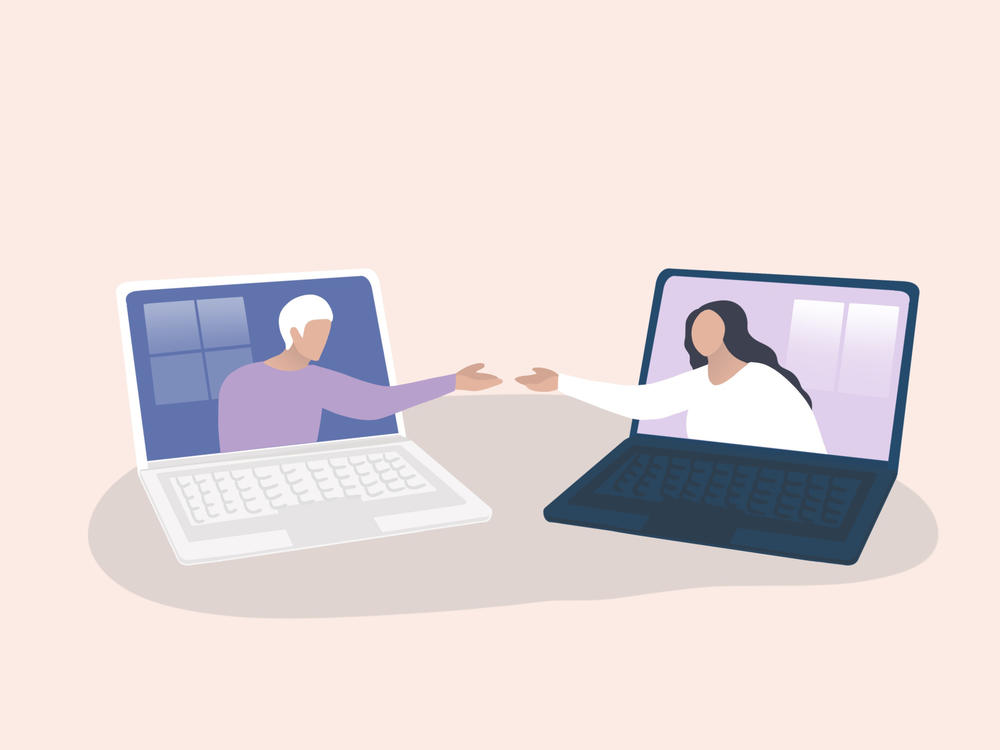Section Branding
Header Content
A Doctor's Thanksgiving Plea: Stay Home And Stay Safe
Primary Content
Thanksgiving in my childhood home is more of a sport than a meal. Why have one pie when you can have seven? Why have a turkey when you can stuff a chicken inside a duck, and the duck inside a turkey? Why have one family over when you can invite the whole neighborhood?
Some relatives prepare for the day like athletes: My cousin's game plan, for instance, was to eat heavily for the week before, then fast for 24 hours. "That way, your stomach is stretched out before you get really hungry."
As an internal medicine doctor, I can't attest to the soundness of his plan, but as a witness I can say no one could match his insatiable enthusiasm.
But this year, Thanksgiving will be in my apartment in Seattle, far from my parents' Chicago home. My siblings will be scattered across the country with their children. There will probably be a Zoom call and waves and smiles through a screen — a poor but necessary substitute for something much more joyous. But this is the only way to celebrate in 2020, because I am determined that this Thanksgiving will not be my family's last.
It's hard to imagine a more dangerous holiday than Thanksgiving in 2020. COVID-19 is a respiratory disease. It's spread by droplets sprayed while talking or breathing heavily in close proximity — especially with prolonged, indoor exposure. Traveling from one hot spot to another, eating with multigenerational family and friends in close proximity, indoors, for hours could become a national superspreader event, with catastrophic consequences.
Many people are trying to figure out how to celebrate safely, for instance by getting tested before traveling. But the accuracy of tests varies widely depending on how they are done, and at what stage of infection someone is. Tests are also just a snapshot of the day they are taken. You can still contract the virus while traveling, or stopping at the grocery store for more butter and potatoes on Thanksgiving eve.
Inviting friends over may seem lower risk, especially if everyone is young and healthy, but these kinds of gatherings are fueling the rapid spread of the pandemic. And while older people and those with underlying conditions are at higher risk for more serious cases of COVID-19, every person who is infected risks prolonged illness and even death. And remember one infected person can end up passing on the infection to hundreds of other people.
We are at a crossroads in the pandemic in the United States. New cases are now regularly topping 150,000 daily, and hospitalization rates are at an all-time high. The mortality rate has mercifully fallen from initial COVID-19 rates, a reflection of both younger populations becoming infected, and the ability of modern medicine to confront a completely new disease at breakneck speed.
But we can't keep people alive if we run out of hospital beds. We can't keep people alive if we run out of oxygen dispensers, as happened in the peak in New York, or gloves, as happened recently in Alaska. We can't keep people alive if coronavirus-positive nurses are being asked to keep working, as is happening in North Dakota. The people keeping us alive are not an inexhaustible resource. They are at the limits of human endurance. Many of them have become sick. Many have died.
The only responsible way to spend Thanksgiving this year is in your home or with people you have been living with for the past two weeks, as the Centers for Disease Control and Prevention recommended on Thursday. For many people, this will mean spending the holiday alone, and that is not a small thing to ask.
In medical training, I spent a few holidays by myself, in my apartment, after working a long shift. The loneliness was crushing. Only the purposefulness of my days kept me going.
If you will be alone, call your biological and chosen families. Make food for a neighbor and leave it on their doorstep. Raise and donate money for people on the streets. Help the elderly get on a video call, or call them on the phone if they can't. This has been a very long year for them, and they may not have many left.
When the first cases of COVID-19 were identified, not far from where I practice, we could not have predicted that it would be so out of control 10 months later. We could not have predicted the economic devastation. We could not have predicted that so many would die, in isolation, with a stranger's gloved hand holding theirs.
We are all tired, and longing for comfort and joy. But now, with a vaccine coming, there is an end in sight. It will not be long before we can embrace one another, eat together and let this year become a distant memory.
I beg of you, don't let this Thanksgiving be your last.
Elisabeth Poorman is an internal medicine physician and writer. She practices in Seattle and is on Twitter at @drpoorman.
Copyright 2020 NPR. To see more, visit https://www.npr.org.

